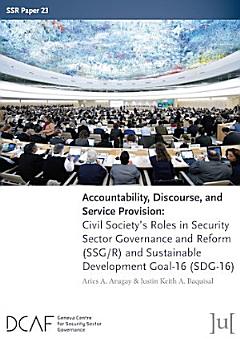Accountability, Discourse, and Service Provision: Civil Society’s Roles in Security Sector Governance and Reform (SSG/R) and Sustainable Development Goal-16 (SDG-16)
About this ebook
About the author
Aries A. Arugay (Georgia State University, Ph.D.) is Professor and Chairperson at the Department of Political Science at the University of the Philippines Diliman. He is also Visiting Senior Fellow and Coordinator of the Philippine Studies Programme at the ISEAS – Yusof Ishak Institute (Singapore). His research interests are comparative democratization, security sector governance, foreign and security policy, and digital politics. Aries is the Editor-in-Chief of Asian Politics & Policy, a journal in political science and international relations published by Wiley-Blackwell and the Policy Studies Organization. He has published in Asian Perspective, Pacific Affairs, Journal of East Asian Studies, American Behavioral Scientist, and the Journal of Current Southeast Asian Affairs, among others.
Justin Keith Baquisal is a Resident National Security Analyst at FACTS Asia and a Southeast Asia Young Leader at the International Institute for Strategic Studies’ Shangri-La Dialogue. He has a degree in political science (magna cum laude) from the University of the Philippines Diliman and is currently a graduate student in the same institution. He has published policy briefs, op-eds, and academic articles on Philippine national security, foreign policy, and autocratization, which have appeared in Southeast Asian Affairs, Pacific Affairs, The Diplomat, Fulcrum, and Asialink.







